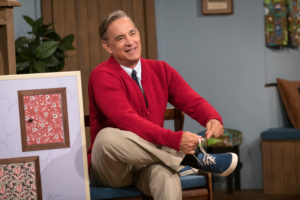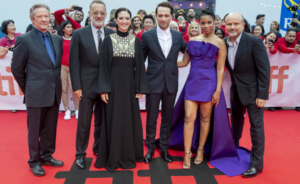
Susan Kelechi Watson is known for portraying the ‘calming, voice of reason wife’ of Sterling K. Brown in the Emmy winning television series “This Is Us” she plays a similar role in the heartwarming film, “A Beautiful Day in the Neighborhood.” Premiering to a packed crowd in Toronto at the Toronto International Film Festival, my screening received a standing ovation. Watson co-stars as Andrea Vogel with Matthew Rhys as Esquire journalist Lloyd Vogel, whom the film centers. Tom Hanks portrays the beloved children’s television icon, Fred Rogers. Marielle Heller of “Can You Ever Forgive Me?” fame, directs the film from a screenplay penned by Micah Fitzerman-Blue and Noah Harpster.

Grudgingly, the cynical award-winning journalist Lloyd Vogel accepts an assignment to write an Esquire profile on “Heroes,” of which Fred Rogers is his subject. Little did Vogel know that meeting Rodgers would not only change his life—he also gained a life-long friend.

I chatted with Watson last Tuesday, November 26 via phone, the audio will air on Hollywood 360 Radio Network in two weeks, stay tuned for hour and time.

Sarah Knight Adamson: Hi, thank you so much for speaking with me this morning on Hollywood 360 Radio Network. I really admired your work on “A Beautiful Day in the Neighborhood.” Congratulations. You were wonderful. Could you tell me your vision with, along with the director, Marielle Heller, that you had for the character?
Susan Kelechi Watson: You know, I wanted to make sure that she was not the standard wife and mother; that she felt like a whole person. That she had her life going on as well. It was a specific relationship that it felt like their relationship had its own tensions and its own history, and it felt, it felt very specific to them. That was important to me. We understood that this woman was also a career mother that was struggling to put her life back together as well as having a baby and figure everything out as well. So, those are some of the things that were really important to me in creating Andrea.
SKA: What did you learn from working with Tom Hanks?
Because I admire Tom Hanks’s work, it was very important for me to learn from him. One of the biggest things I have learned was how to “put the performance in your eyes” is the best way I can say it, especially for feelings and how expressive the eyes are. When you look at him, it is not as demonstrative like in the body, but there was so much this whole world going on in his eyes. It was one of the things that I found so amazing and profound about his performances. It is also technically very hard to do because the eyes are the windows to the soul, and you probably have to believe something for your eyes to be saying it. So, that was a big lesson in watching him and having the opportunity to watch him. It was really something to see.
SKA: Can you talk about why Fred Roger’s teachings are so important in our times?
They are timeless. I think that is the thing about them; I think you could talk about them at any time and they would be important. They are just universal truths that will resonate with anyone at any time. The simplicity of them allows them to be translated to anyone. In speaking to children, he is speaking to all of us, but he is able to use a dialogue that is not complicated. It is something that we all get and we can identify with. So, at the time that he was speaking, it was a turbulent time as well. The sixties and seventies were no walk in the park. This was a very troubling time. The eighties, the Reagan era, we can go into any decade he was in and speak about what was going on at the time.

SKA: Yes. I did read somewhere where you were asked about that, and you mentioned empathy that you thought was part of Fred Rogers’s teachings or that it creates empathy. Could you speak to that, please?
It is important to first say: “Do I know where this person is coming from?” Before I judge or before I speak or before I assume anything. I think it is important to listen, and that is when I give major things, is to take time and listen and then see where you can identify with a person before you respond. We think about it like, “Oh, that is, you know…” It is such a human way to approach a conversation to say, “We are all human,” and that was the closest conversation from what we have in common first rather than what is different.
SKA: Did you grow up watching Fred Rogers, and if so, what did you learn from him?
I did, and I actually learned to learn from other people. He kind of teaches you to learn from other people. He would invite people over to the house, or people would stop by the garage, somebody would knock, and somebody would come over, and there was always something to share. He was always excited to learn about the world, even if he did not quite get it. A lot of times on his show, he would not do things perfectly, or he would leave projects incomplete if he could not finish it because he believed children should know that adults make mistakes. There was something about watching Mr. Rogers, who looks completely different from whoever is knocking on his front door, he tried to incorporate what this new person has taught him. Whether it was a word or whether it as something about their community or whether it was something about their job. He did not have anything to do with those things, but he was really curious about them and was willing to welcome them in with open arms. That is something I learned about: curiosity and learning from others.
SKA: Is there anything you would like to say about the movie?
It is a movie that takes it’s time. I feel like what I hope the audiences do is: be in the moment and allow it time. Because it was such a part of Mr. Rogers, pacing. As our life pacing was to take time, and the movie does a really great job of paying tribute to that, of really being with a person and taking a moment to be in that space with the person and not rushing. So, that is something that I hope people will gain. It can be really moving when you do because it becomes a really moving piece. That is what I hope people want to experience this Thanksgiving.
SKA: Oh, absolutely, I agree so much. I am such a champion of the movie and of your performance and all the performances. I cannot thank you enough. It just makes me feel so good. I hope to interview you in person at the Critic’s Choice Awards. That would be great, as I have talked to Sterling a little bit, but now I look forward to meeting you in person. You are so talented, Susan, and I wish you all the best.
Thank you so much. That means so much, and I so look forward to meeting you. This is a great opening entryway, right? Over the phone first. It is the icing on the cake.
Sarah Knight Adamson © November 30, 2019
